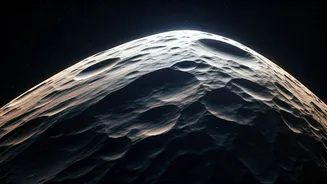Ryugu's Ancient Secrets
The asteroid Ryugu, a celestial body, has yielded secrets far older than previously imagined. Scientists have been studying samples from Ryugu, collected
during a mission, and have made a remarkable discovery. The investigation indicates the presence of water that is approximately a billion years old. This discovery is a significant development, as it provides crucial data about water's history in the cosmos. The research suggests that water, an essential ingredient for life, has a long history in space, extending back billions of years. This finding enhances our understanding of the evolution of the solar system and provides valuable insight into the origins of water on Earth. The analysis of the asteroid's composition offers a deep dive into the formative years of our solar system, offering clues about how planets and the essential elements they require, like water, came to be.
Water's Billion-Year Journey
The water traces discovered on Ryugu suggest that water, in its current form, has persisted over vast cosmic timescales. The findings indicate that the water found on Ryugu has remained intact for about a billion years. These revelations provide insight into the durability of water molecules in space. The durability, combined with the presence of these ancient molecules, helps researchers understand how water may have been delivered to our planet. It points towards the potential for water to be a common element in the universe. This discovery has profound implications, hinting at the possibility of water existing across the cosmos for a very long period. This perspective encourages further investigations into the composition of space rocks and planetary bodies, expanding our comprehension of the origins of life and the conditions required to sustain it.
Unveiling Asteroid's History
The examination of Ryugu samples has provided a deeper understanding of the asteroid's past. Scientists were able to piece together details of its formation and evolution. The traces of water present within the asteroid are particularly significant. They confirm the hypothesis about how asteroids have played a crucial role in bringing water to the inner solar system, including Earth. Analysis of the samples also gave information about the conditions that the asteroid encountered during its lifespan. Scientists can now better understand the conditions in space and how they affected Ryugu. This includes information about temperature fluctuations, radiation exposure, and the impact of cosmic particles. This research is vital because it helps us improve the models we use to study planetary formation. The findings enhance our capacity to comprehend the origins of the Earth and the presence of water, as well as the potential for habitability across the universe.
Impacts of the Findings
The scientific results from the Ryugu investigation have significant repercussions for numerous fields. The findings validate assumptions about water's presence and evolution in space, promoting additional research into the genesis of the solar system. These findings have far-reaching implications, affecting astrophysics, planetary science, and astrobiology. They can aid in refining models of planetary formation and assessing the habitability of celestial bodies. The discovery of water molecules dating back a billion years fuels speculation about the possibility of life existing beyond Earth. This discovery sparks excitement among researchers and encourages the development of future space exploration missions. The findings from Ryugu motivate us to keep examining space and exploring the mysteries of the universe, and will likely serve as inspiration for future studies and deep space exploration efforts.














